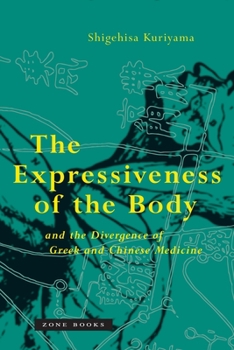The Expressiveness of the Body and the Divergence of Greek and Chinese Medicine
Select Format
Select Condition 
Book Overview
An illuminating account of how early medicine in Greece and China perceived the human body
Winner of the William H. Welch Medal, American Association for the History of Medicine
Format:Paperback
Language:English
ISBN:0942299892
ISBN13:9780942299892
Release Date:March 2002
Publisher:Zone Books
Length:344 Pages
Weight:1.27 lbs.
Dimensions:1.1" x 6.0" x 8.8"
Age Range:18 years and up
Grade Range:Postsecondary and higher
Customer Reviews
4 ratings
Best book on Chinese medicine. Unrivaled explanatory power.
Published by Thriftbooks.com User , 21 years ago
This remarkable book accomplishes several things. First, it is a stunningly CLEAR analysis of the fundamental concepts of Chinese medicine. For example: what is the difference between 'pulse analysis' in China and 'taking the pulse' in the West? What is the vision of anatomy in early China? How do doctors conduct an examination? What do they look for, and what do they see? How are the abstract, understated illustrations of Chinese medicine to be read and understood? We find that physicians in China not only looked for different things, both healer and patient 'experienced' differently. If this book had restricted itself to China, that would have been enough. However, it does much more. It also digs deeply into formative ideas of Western civilization, ideas that would become what we now call Western biomedicine. Students of Western medicine are obligated, in my opinion, to read the profound chapter on muscles. It transformed my understanding of what we call anatomy. If you have ever wondered about the differences between Chinese medicine and Western biomedicine, this is the book. I used this book one semester to teach undergraduates, and mid-semester, two students approached me and said this: 'We took your class hoping to read a book like this.' In terms of the writing, this book is a model of economy and lucidity.It's an immensely enriching work of scholarship.
Clear but only within the narrow of scholarly language
Published by Thriftbooks.com User , 23 years ago
The author is to be commended for doing a service, not only to the medical community, but to all who would seek a greater understanding of how perception feeds and shapes knowledge as such. The prose is elegant, and the subject matter selected and laid out judiciously for the purpose of maximum comparison. The author demonstrates, convincingly that if Eastern Medicine seems strange (and it always did) to Western eyes, Western Medicine is no less so in its peculiar assumptions about the body. All fine and good, BUT... The reason I give it four stars is that there is a lacuna in the logic of comparison here. The design of the study intended to do a one-on-one comparison necessarily restricts the theme drastically. What is seriously lacking is a treatment of the influence on the development of Chinese medicine of Taoist yoga and other esoteric techniques concerning the body, techniques well articulated during the Former Han Dynasty (ca. 200 BCE). The Helenic Civilization, and the West in general, is distinguished from the East by virtue of its lack of systematic techniques of mind-body control, the likes of which may be found in yoga and the various martial arts of the Chinese variety. It seems reasonable to assume that a martial arts technique has to be grounded in a particular, but thorough understanding of the body. And indeed, much of Chinese martial arts and yoga techniques, and medicine are based on experience of things not within the ken of Western modes of perception -- The notion of the ethereal body and various modes of consciousness,for example. But, alas, so much of what is within Chinese medicine and experience remains unmeasured and perhaps unmeasurable by modern Western medical episteme. There are some genuine efforts today in other sectors to bring scientific measurement within the scope of realities as espoused by Buddhist psychology. But real substantial dialogue is still way off, I think, insofar as what counts for episteme in the East is routed through an empirical "meditational" experience of the mind. The author, in attempting to maintain a certain clarity of scholarly prose and presentation appears to have deliberately skipped over much of what would really make the topic interesting. One only hopes that either the author himself or others will bring out the entree soon now that the hors d'oeuvres have been served. But, there are limits to how much one can compare the two traditions using material evidence alone.
A book of major importance
Published by Thriftbooks.com User , 24 years ago
This book was given the Award for the Achievement of Excellence in the Spring/Summer 2000 issue of Oriental Medicine Journal.
lfootemd
Published by Thriftbooks.com User , 24 years ago
Anyone who has explored and studied Chinese medicine is struck by the different perspective it offers. For those intrigued by the history behind how western and eastern perceptions diverged so greatly, this book is an excellent start. In a very scholarly fashion SK has drawn on ancient Greek and Chinese texts to dilineate where that split in perception began. Plato's works reflect a view of medicine not unlike the authors of early chinese medicine texts. Later texts by Galen and Hippocrates, however, begin to show signs of the "evidence based medicine" we all recognize as "western medicine". What led to that transition is the focus of this book and is very absorbing. KS breaks the discussion down into topics such as "Muscularity and Identity", "Blood and Life", and "Wind and Self". Each chapter exploring the vast difference in perception as well as application. This potentially is a very excellent start to developing a bridge between eastern and western medicine. This book gets 4 stars, however, as the vocabulary is cumbersome. I recommend you have a dictionary at your side at all times.






